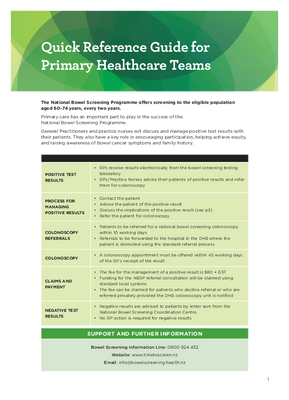Quick Reference Guide for Primary Health Teams - HP6836

Gives information for primary health care providers about the National Bowel Screening Programme pathway, including communicating with patients when a test is positive, and colonoscopy.
The full resource:
The National Bowel Screening Programme offers screening to the eligible population aged 60–74 years, every two years.
Primary care has an important part to play in the success of the National Bowel Screening Programme.
General Practitioners and practice nurses will discuss and manage positive test results with their patients. They also have a key role in encouraging participation, helping achieve equity, and raising awareness of bowel cancer symptoms and family history.
| POSITIVE TEST RESULTS |
|
| PROCESS FOR MANAGING POSITIVE RESULTS |
|
| COLONOSCOPY REFERRALS |
|
| COLONOSCOPY |
|
| CLAIMS AND PAYMENT |
|
| NEGATIVE TEST RESULTS |
|
Support and further information
- Bowel Screening Information Line: 0800 924 432
- Website: www.timetoscreen.nz
- Email: info@bowelscreening.health.nz
National Bowel Screening Pathway
1 Assessment of family history, in accordance with Guidance on Surveillance: www.health.govt.nz/publication/guidance-surveillance-people-increased-risk-colorectal-cancer
Positive results information for patients
What does a positive test result mean?
A positive test result does not necessarily mean you have bowel cancer.
Small amounts of blood in your bowel motion are most commonly caused by polyps, or other minor conditions such as haemorrhoids (piles), which can easily be treated.
If your test is positive it means you will need a further investigation. This will usually be a colonoscopy (an internal examination of the large bowel).
Your doctor or a nurse will contact you to discuss your results and the type of follow up test that is right for you.
If you have a family history of bowel cancer, you may also be advised to see your doctor, or be referred to the New Zealand Familial Gastrointestinal Cancer Service.
What does a colonoscopy involve?
A colonoscopy involves a specially trained health professional putting a thin tube into your anus (bottom). There is a very small camera on the end of the tube which is used to examine the lining of your bowel, to see if there are any problems.
A colonoscopy can identify whether polyps or cancers are present.
If a cancer is found a small sample or biopsy will be taken and if polyps (growths) are found they will generally be removed. The samples or removed polyps are sent to the laboratory for analysis to check for cancer.
Polyps are not cancers, but may turn into a cancer over a number of years. Taking a biopsy or removing polyps is usually painless.
About seven in 10 people who have a colonoscopy as part of the National Bowel Screening Programme will have polyps, which if removed may prevent cancer developing
About seven in 100 people who have a colonoscopy as part of the National Bowel Screening Programme will be found to have cancer and most will require treatment
Are there risks from a colonoscopy?
Colonoscopy is considered a safe procedure. However, as with most medical procedures, problems can sometimes happen.
There is a small risk the colonoscopy procedure itself, or removal of polyps, will cause bleeding or damage to your bowel and you may need further treatment.
Code: HP6836
